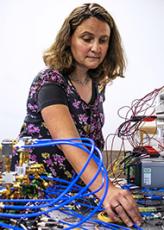Dr Francesca Parmigiani PhD in the Optical Fibre Communications Group, 2006
Principal Researcher at Microsoft Research Cambridge

Being able to work in a very dynamic environment, with world-class experts in many aspects of photonics, allowed me to flourish and succeed as a well-recognised scientific expert in my field, opening many career doors.
What were your highlights of studying at the Optoelectronics Research Centre?
I had such an incredible time during my postgraduate studies at the University of Southampton. It was my very first experience abroad and I cannot highlight enough how well I was welcomed as a new joiner and how I felt part of the Optoelectronics Research Centre’s community from day one.
Being able to work in a very dynamic environment, with world-class experts in many aspects of photonics, allowed me to flourish and succeed as a well-recognised scientific expert in my field, opening many career doors to multiple successful career opportunities.
Most of my colleagues had a lasting impact on my life and study experience, and, while we are now spread all over the world, they still remain very good friends of mine.
What research topic did you focus on during your PhD at Southampton?
During my PhD at Southampton, I focused on linear shaping of optical signals and nonlinear effects both in optical fibres and integrated photonics for a variety of applications, primarily for transmission impairments compensation.
I was able to go to some of the world’s largest conferences in my field, which helped me get to know leading experts in my field and build a network of collaborators that helped me grow in my area.
How did your education at Southampton prepare you for your future career?
The University of Southampton is a fantastic place to study that lives up to its great reputation. It prepares its students by empowering them with world-class insights and by gaining a sense of self confidence as they follow their passion.
How has your career developed since completing your PhD at the Optoelectronics Research Centre?
The Optoelectronics Research Centre (ORC) at the University of Southampton is one of the world’s leading institutes for photonics research and working on my doctoral research there has had a huge impact on my scientific career. Since graduating in 2006, I remained at the ORC and worked as a researcher for almost 12 years. During this time, I was awarded a prestigious five-year Royal Academy of Engineering Fellowship focussing on a new disruptive way of amplifying optical signals for high-speed optical transmission. In 2018, I joined the Optics for the Cloud team at Microsoft Research in Cambridge, where I am currently a Principal Researcher. I am pleased to maintain my relationship with Southampton as a Visiting Researcher at the ORC.
What is the focus of your current role at Microsoft?
As member of the Optics for the Cloud team at Microsoft Cambridge, my focus is on advancing and enabling the adoption of optical technologies in the rapidly growing field of cloud sectors, such as storage, network, compute. The research also spans the entire vertical stack, ranging from optical device fabrication, to optical system and sub-system design, to co-design and integration with the rest of the data centre infrastructure and will include new applications enabled by optical technologies.
What are the benefits to businesses of employing and/or sponsoring PhD graduates/students?
I believe there are many benefits to businesses of employing and/or sponsoring PhD graduates/students. I am very proud to say that Microsoft have a similar point of view, where we have funded PhD scholarships at Southampton and across Europe over the years that are well aligned with our current research. We also fund internship targeting again both PhD, graduate and undergraduate students.
What tips would you give to current students at the Optoelectronics Research Centre?
So much wisdom that I would like to pass on to the current students!
I would definitely pass on the tip of our lab director here in Cambridge: “truly aspire to transform the world through deep research”. Key to achieving that is to have bold and inquisitive minds.
Another very inspiring quote I would like to share comes from Bill Gates, which I believe applies so well to research: “It’s fine to celebrate success but it is more important to heed the lessons of failure.” Never be afraid of failures and don’t let them demotivate you, they are critical steps towards your, and any, path to success, so always enjoy life through the work that you do.